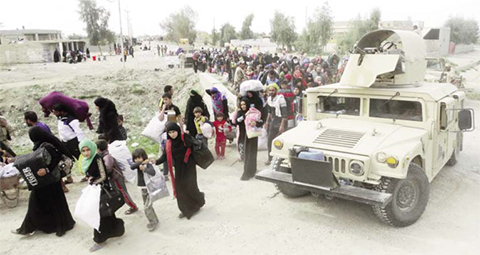 BAGHDAD: Civilians leave their houses after clashes between Iraqi Security forces and Islamic State group extremists outside Ramadi, west of Baghdad. Germany’s federal criminal police said yesterday they are in possession of files containing personal data on members of Islamic State group and believe them to be authentic. — AP
BAGHDAD: Civilians leave their houses after clashes between Iraqi Security forces and Islamic State group extremists outside Ramadi, west of Baghdad. Germany’s federal criminal police said yesterday they are in possession of files containing personal data on members of Islamic State group and believe them to be authentic. — APBERLIN: Germany’s federal criminal police said yesterday they are in possession of files containing personal data on members of the extremist Islamic State group and believe them to be authentic. The announcement came after Britain’s Sky News reported it had obtained 22,000 Islamic State files on the border with Turkey and Syria, files that detail IS fighters’ real names, where they were from, telephone numbers, and even names of those who sponsored and recruited the militants.
Though the significance of these files is yet to be gauged, they could be the largest yet treasure trove of documents found on IS and the most significant leak on its past and present fighters and operations across the Mideast. They could also shape the campaign against the extremist group, which emerged from Al-Qaeda in Iraq. The cache, exposing its members and their families, could undermine its future ability to recruit and inspire wouldbe members.
US Army Col Steve Warren, spokesman for the US-led coalition against the Islamic State, said the information could help the coalition fight the Islamic State group by aiding in a crack-down on IS’s foreign fighter networks. He said that while he was not able to verify the documents, he hoped that “if there is a media outlet that has these names and numbers, I hope they publish them.” This would help bring attention to the problem of foreign fighters joining IS, and would help law enforcement crack down on the problem, he said. “This would allow the law enforcement apparatus across the world to become much more engaged and begin to help do what we can to stem this flow of foreign fighters - so we’re hopeful that its accurate and if so we certainly plan to do everything we can to help,” he said.
Stolen memory stick
A disillusioned former member of Islamic State has passed a stolen memory stick of documents identifying 22,000 supporters in over 50 countries to a British journalist, a leak that could help the West target Islamist fighters planning attacks. Leaks of such detailed information about Islamic State are rare and give Britain’s spies a potential trove of data that could help unmask militants who have threatened more attacks like those that killed 130 people in Paris last November. A man calling himself Abu Hamed, a former member of Islamic State who became disillusioned with its leaders, passed the files to Britain’s Sky News on a memory stick he said he had stolen from the head of the group’s internal security force.
On it were enrolment forms containing the names of Islamic State supporters and of their relatives, telephone numbers, and other details such as the subjects’ areas of expertise and who had recommended them. One of the files, marked “Martyrs”, detailed a group of IS members who were willing and trained to carry out suicide attacks, Sky said. Richard Barrett, a former head of global counter-terrorism at Britain’s MI6 Secret Intelligence Service, said the cache was “a fantastic coup” in the fight against Islamic State.
“It will be an absolute goldmine of information of enormous significance and interest to very many people, particularly the security and intelligence services,” Barrett told Sky News. Sky said it had informed the British authorities about the documents which were passed to its correspondent, Stuart Ramsay, at an undisclosed location in Turkey.
Western security sources said that if genuine, the files could be gold dust as they could help identify potential attackers and the networks of sympathisers behind them, and give insight on the structure of the group. Reuters was not able to independently verify the documents, given their provenance. A selection of them was published in Arabic. Islamic State militants claimed responsibility for the Nov. 13 attacks in Paris and the Oct. 31 downing of a Russian passenger plane over Egypt’s Sinai region that killed 224. They have promised more attacks on the West and Russia.—Agen









